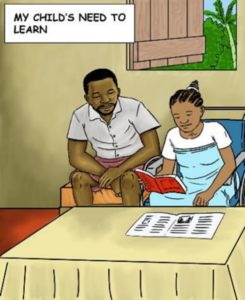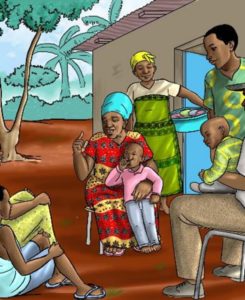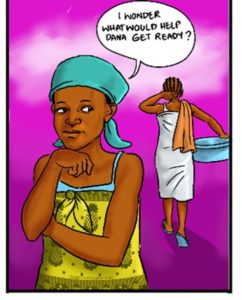Here’s what’s happening around the world in the area of child welfare and protection.
“Families, parents and caregivers play a central role in child well-being and development. They offer identity, love, care, provision and protection to children and adolescents as well as economic security and stability. Families can be the greatest source of support for children but also – under unfortunate circumstances – the greatest source of harm.”[1]
Maestral International has been working with UNICEF Sierra Leone to support the development of a positive parenting education program for the country. A long history of conflict and high levels of poverty place stress on families. Many children are at risk of family separation through practices such as ‘menpikin’, where children live with extended family or others away from home and many are at risk of exploitation. A 2019 study on violence in the home conducted by Maestral found that many parents and caregivers regularly practice harsh parenting and struggle to provide adequate care. The same study also found that most parents want to do what is best for their children and are open to developing their positive parenting practices. The study led to a commitment from the Ministry of Social Welfare to develop a national parenting program that would build on these positive practices, as well as draw on global good evidence.

The program places the idea of children’s rights in a framework of child development and male engagement is encouraged throughout the program
Between March 2020 and May 2021, a team of Maestral consultants worked with UNICEF, the Ministry of Social Welfare and a committed national Technical Working Group (TWG) to design and pilot a parenting program. The Technical Working Group represented important government and civil society representatives with experience in child protection, reducing violence, and delivering programs at community level.
The overall vision for the program, approved by the TWG, is that: “Children and adolescents in Sierra Leone grow up in violence-free, nurturing, and supportive family environments that promote their wellbeing and development.” The program – Good Kombra na Glady Family (good caregiving / nurturing makes a happy family) – has three curricula for parents and caregivers with children aged 0 to 5, 6 to 10 and 11 to 17. They include aspects of global best practice and national programs being delivered for specific age groups[2], and address specific parenting aspects that the TWG and key informants outlined as key for Sierra Leone, including focusing on violence prevention that addresses harmful practices, and working closely with community structures, neighbors and elders to embed positive parenting.

Illustrations were reviewed by TWG representatives to reflect family life in both urban and rural Sierra Leone
Male involvement is emphasized throughout. The program uses a wide variety of tools, including group discussions, reflection and role plays. Images and stories developed by Ali Ombati, a Kenyan artist whose illustrations were selected by the TWG from a range of potential artists, are used throughout to simply convey positive parenting practices and enable further discussion. The cover illustrations were done by Alusine Kamara – a sixteen year old Sierra Leone artist.

The program encourages discussion about sensitive topics such as puberty and this was welcomed by parents and caregivers
Three NGOs piloted the adolescent version of the program – Defence for Children International in Koinadugu, International Rescue Committee in Bo and Save the Children International in Western Region (Freetown). The Maestral national team members supported delivery, the Ministry of Social Welfare and implementing CSOs had regular feedback meetings to review progress and enable the completion of the final version of the curriculum and training materials. NGOs implemented differently, some with single sex and some with mixed groups, although all with one male and one female facilitator. In one of the communities where sessions were being conducted in single sex sessions, the women’s group decided, after Session 4 on the importance of nurturing and attachment (“Why love matters”), that sessions should be conducted together, as they felt it important to hear each other’s views.
It has been exciting to get feedback from the piloting that shines a light on how much both men and women are interested in providing nurturing care for their children and discuss sensitive topics as a family. For example, in a focus group discussion, a father said that one session supporting him to talk to his daughter about menstruation. His daughter then chose to come and talk to him about her periods. In another pilot community, a father talked about how happy he was that there was a session on harmful practices. He had learned that his daughter was already in the bush undergoing the procedure. His daughter subsequently dropped out of school for two years. His honesty enabled an in-depth discussion that children should not be initiated before they are 18 and only then, if they choose.
In one community, three community leaders were permanently part of the process. A ‘mammy queen’ (senior female leader) attended the facilitator training and all sessions and was central in providing feedback at the end. A chief and his speaker attended alternate sessions and were engaged in the process throughout. The chief reported that formerly, during family disputes brought to him, he listened to what the husband said. Now he and his chiefs also talk to the wife and children to get their views before a decision is made. He said that the decisions that the leaders take are now about creating peace within the family.
The piloting ended in April 2021. There are still a number of changes and improvements that are needed – the piloting highlighted the importance of investing in facilitator training and more work is needed to monitor fidelity and gather participants’ views in ways that are simple to handle in a low-literacy context. However, the pilot has shown that it is possible to talk about family issues, often very sensitive, and we are looking forward to seeing the final versions of the two additional curricula before the national roll out.
Project Team: Siân Long, Alice Koroma, Leonora Borg, Atieno Odenyo, Umu Jalloh, Maestral Sierra Leone parenting program team
Artist: Alfred Ombati and Alusine Kamara
Footnotes:
[1] Daly, M., Bray, R., Bruckhauf, Z., Byrne, J., Margaria, A., Pecnik, N. & Samms-Vaughan, M. (2015). Family and Parenting Support: Policy and Provision in a Global Context
[2] These include Parenting for Lifelong Health’s suite of programs, International Rescue Committees’s parenting programs, and ProMundo’s Programme P for male engagement. Save the Children in Sierra Leone and IRC’s Girl Shine were both already being delivered in a contextually adapted way.